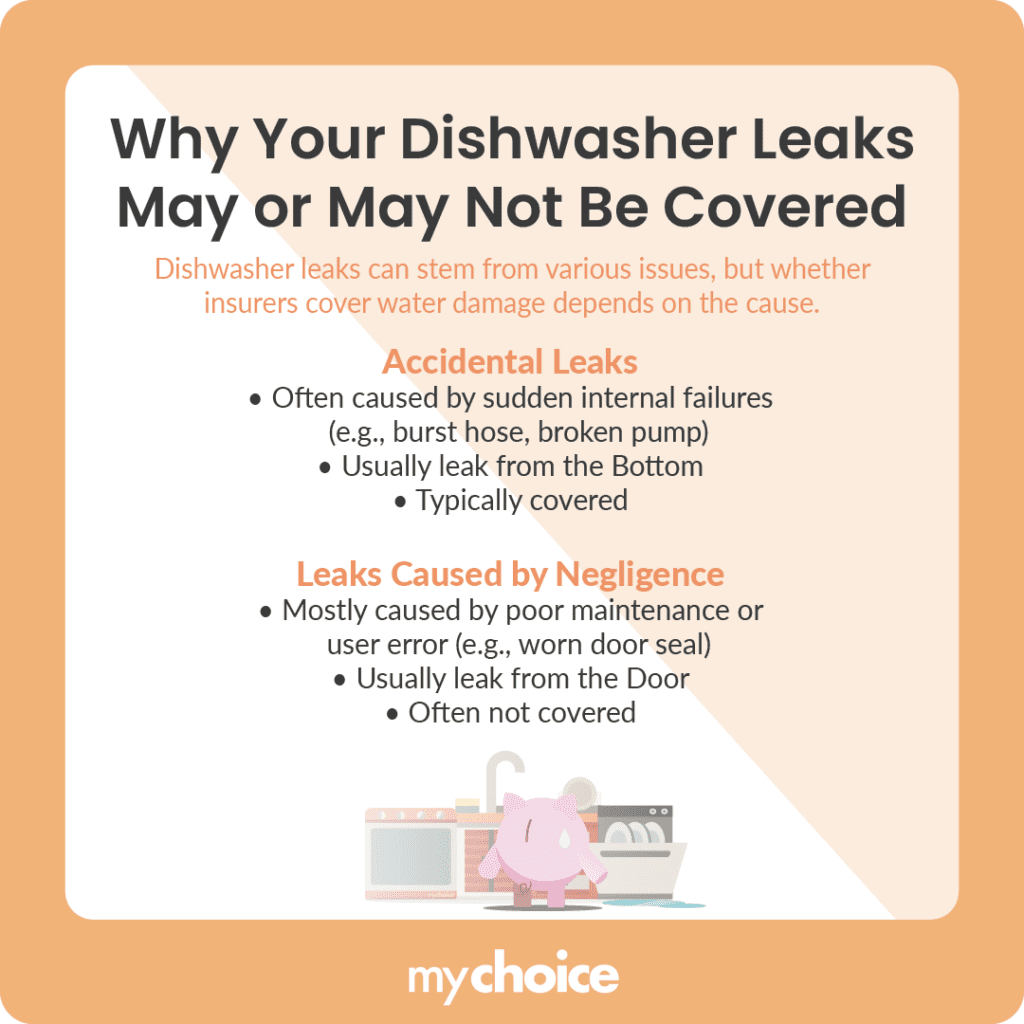Sudden dishwasher leaks can leave homeowners scrambling, especially when water damage starts to occur on the floors. Water damage has replaced fire and theft as Canada’s largest source of claims. Around 26% of Canadians experience water damage incidents in their homes each year. Because leaky dishwashers can quickly turn into a nightmare, many Canadians wonder: Will my home insurance cover damage from a leaking dishwasher?
This article will answer all the questions you have about whether your home insurance suffices, why dishwashers leak in the first place, and what you can do to avoid denied insurance claims.
Are Damages from a Leaking Dishwasher Covered by Insurance?
Yes, your home insurance can cover damages from a leaking dishwasher if the water leak is sudden and accidental. Tenant insurance can also cover water damage. Many insurers cover “water escape” from plumbing systems, which occurs when your dishwasher suddenly bursts or overflows unexpectedly.
However, this coverage has limitations and exclusions. For example, most policies won’t cover gradual leaks caused by slow deterioration, corrosion, or negligence, as homeowners have ample time to repair their systems. Instead, these are considered poor maintenance issues rather than an accident.
In addition, your policy won’t cover the cost of repairing or replacing the appliance itself. It will cover the resulting property damage, which might encompass warped floors or water-damaged drywall.
Why is My Dishwasher Leaking?
There are many reasons a dishwasher might leak, and identifying the cause is vital to repairing it. Here are some common culprits for a leaking dishwasher:

Dishwasher Leaking from the Bottom vs. Door: Why Insurers Treat Them Differently
Dishwashers typically experience two types of leaks:
- From the front door
- Underneath
Again, whether your insurer will provide coverage for water damage depends on the cause of the leak. Leaks from the bottom vs. leaks from the door imply very different causes.
Filing a Claim for a Leaking Dishwasher
When you file a claim for a leaking dishwasher, an adjuster or contractor will determine the cause of the leak and whether this was due to long-term wear or an improperly installed part. Sometimes, there are gray areas, such as a door latch suddenly snapping.
Always document when and how the leak occurred and provide as much information as possible.
How to Install a Dishwasher (The Claims-Prevention Edition)
Installing your dishwasher correctly goes a long way in preventing leaks and future claims. Here’s how to hook up a dishwasher.
Replacing a Dishwasher? What to Check to Avoid a Future Denied Claim
Getting a new dishwasher is a great way to prevent future leaks and water damage. However, you still need to be proactive about installation and documentation. Here’s a handy checklist of things to keep in mind to avoid future denied claims:
Key Advice from MyChoice
- Always keep proper evidence of the installation and maintain your appliance to prove to your insurer that you’ve done everything possible to keep your washer in good shape.
- Don’t use regular dish soap, as it can create excess suds that cause your washer to overflow. Use the recommended detergent.
- Review your policy language. Many have wear and tear and maintenance exclusions that apply to slow dishwasher leaks.








